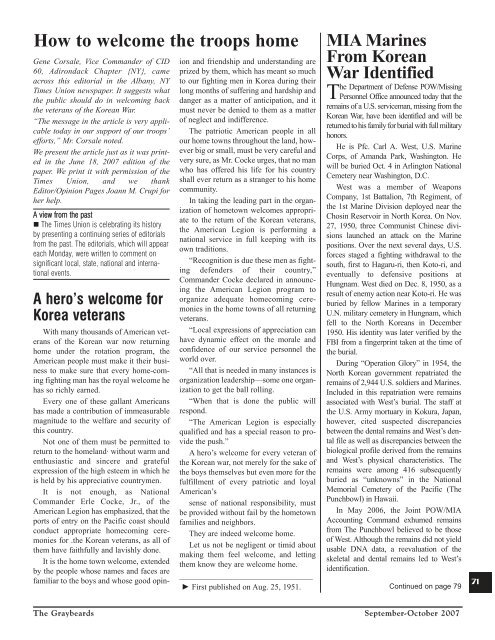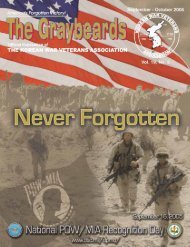The Complete Issue - Korean War Veterans Association
The Complete Issue - Korean War Veterans Association
The Complete Issue - Korean War Veterans Association
Create successful ePaper yourself
Turn your PDF publications into a flip-book with our unique Google optimized e-Paper software.
How to welcome the troops home<br />
Gene Corsale, Vice Commander of CID<br />
60, Adirondack Chapter {NY}, came<br />
across this editorial in the Albany, NY<br />
Times Union newspaper. It suggests what<br />
the public should do in welcoming back<br />
the veterans of the <strong>Korean</strong> <strong>War</strong>.<br />
“<strong>The</strong> message in the article is very applicable<br />
today in our support of our troops’<br />
efforts,” Mr. Corsale noted.<br />
We present the article just as it was printed<br />
in the June 18, 2007 edition of the<br />
paper. We print it with permission of the<br />
Times Union, and we thank<br />
Editor/Opinion Pages Joann M. Crupi for<br />
her help.<br />
A view from the past<br />
<strong>The</strong> Times Union is celebrating its history<br />
by presenting a continuing series of editorials<br />
from the past. <strong>The</strong> editorials, which will appear<br />
each Monday, were written to comment on<br />
significant local, state, national and international<br />
events.<br />
A hero’s welcome for<br />
Korea veterans<br />
With many thousands of American veterans<br />
of the <strong>Korean</strong> war now returning<br />
home under the rotation program, the<br />
American people must make it their business<br />
to make sure that every home-coming<br />
fighting man has the royal welcome he<br />
has so richly earned.<br />
Every one of these gallant Americans<br />
has made a contribution of immeasur able<br />
magnitude to the welfare and security of<br />
this country.<br />
Not one of them must be permitted to<br />
return to the homeland· without warm and<br />
enthusiastic and sincere and grateful<br />
expression of the high esteem in which he<br />
is held by his appreciative countrymen.<br />
It is not enough, as National<br />
Commander Erle Cocke, Jr., of the<br />
American Legion has emphasized, that the<br />
ports of entry on the Pacific coast should<br />
conduct appropriate homecoming ceremonies<br />
for .the <strong>Korean</strong> veterans, as all of<br />
them have faithfully and lavishly done.<br />
It is the home town welcome, ex tended<br />
by the people whose names and faces are<br />
familiar to the boys and whose good opinion<br />
and friendship and understanding are<br />
prized by them, which has meant so much<br />
to our fighting men in Korea during their<br />
long months of suffering and hardship and<br />
danger as a matter of anticipation, and it<br />
must never be denied to them as a matter<br />
of neglect and indifference.<br />
<strong>The</strong> patriotic American people in all<br />
our home towns throughout the land, however<br />
big or small, must be very careful and<br />
very sure, as Mr. Cocke urges, that no man<br />
who has offered his life for his country<br />
shall ever return as a stranger to his home<br />
community.<br />
In taking the leading part in the organization<br />
of hometown welcomes appropriate<br />
to the return of the <strong>Korean</strong> veterans,<br />
the American Legion is performing a<br />
national service in full keeping with its<br />
own traditions.<br />
“Recognition is due these men as fighting<br />
defenders of their country,”<br />
Commander Cocke declared in announcing<br />
the American Legion program to<br />
organize adequate homecoming ceremonies<br />
in the home towns of all returning<br />
veterans.<br />
“Local expressions of appreciation can<br />
have dynamic effect on the morale and<br />
confidence of our service personnel the<br />
world over.<br />
“All that is needed in many instances is<br />
organization leadership—some one organization<br />
to get the ball rolling.<br />
“When that is done the public will<br />
respond.<br />
“<strong>The</strong> American Legion is especially<br />
qualified and has a special reason to provide<br />
the push.”<br />
A hero’s welcome for every veteran of<br />
the <strong>Korean</strong> war, not merely for the sake of<br />
the boys themselves but even more for the<br />
fulfillment of every patriotic and loyal<br />
American’s<br />
sense of national responsibility, must<br />
be provided without fail by the hometown<br />
families and neighbors.<br />
<strong>The</strong>y are indeed welcome home.<br />
Let us not be negligent or timid about<br />
making them feel welcome, and letting<br />
them know they are welcome home.<br />
_________________________________<br />
► First published on Aug. 25, 1951.<br />
MIA Marines<br />
From <strong>Korean</strong><br />
<strong>War</strong> Identified<br />
<strong>The</strong> Department of Defense POW/Missing<br />
Personnel Office announced today that the<br />
remains of a U.S. serviceman, missing from the<br />
<strong>Korean</strong> <strong>War</strong>, have been identified and will be<br />
returned to his family for burial with full military<br />
honors.<br />
He is Pfc. Carl A. West, U.S. Marine<br />
Corps, of Amanda Park, Washington. He<br />
will be buried Oct. 4 in Arlington National<br />
Cemetery near Washington, D.C.<br />
West was a member of Weapons<br />
Company, 1st Battalion, 7th Regiment, of<br />
the 1st Marine Division deployed near the<br />
Chosin Reservoir in North Korea. On Nov.<br />
27, 1950, three Communist Chinese divisions<br />
launched an attack on the Marine<br />
positions. Over the next several days, U.S.<br />
forces staged a fighting withdrawal to the<br />
south, first to Hagaru-ri, then Koto-ri, and<br />
eventually to defensive positions at<br />
Hungnam. West died on Dec. 8, 1950, as a<br />
result of enemy action near Koto-ri. He was<br />
buried by fellow Marines in a temporary<br />
U.N. military cemetery in Hungnam, which<br />
fell to the North <strong>Korean</strong>s in December<br />
1950. His identity was later verified by the<br />
FBI from a fingerprint taken at the time of<br />
the burial.<br />
During “Operation Glory” in 1954, the<br />
North <strong>Korean</strong> government repatriated the<br />
remains of 2,944 U.S. soldiers and Marines.<br />
Included in this repatriation were remains<br />
associated with West’s burial. <strong>The</strong> staff at<br />
the U.S. Army mortuary in Kokura, Japan,<br />
however, cited suspected discrepancies<br />
between the dental remains and West’s dental<br />
file as well as discrepancies between the<br />
biological profile derived from the remains<br />
and West’s physical characteristics. <strong>The</strong><br />
remains were among 416 subsequently<br />
buried as “unknowns” in the National<br />
Memorial Cemetery of the Pacific (<strong>The</strong><br />
Punchbowl) in Hawaii.<br />
In May 2006, the Joint POW/MIA<br />
Accounting Command exhumed remains<br />
from <strong>The</strong> Punchbowl believed to be those<br />
of West. Although the remains did not yield<br />
usable DNA data, a reevaluation of the<br />
skeletal and dental remains led to West’s<br />
identification.<br />
Continued on page 79<br />
71<br />
<strong>The</strong> Graybeards September-October 2007

















